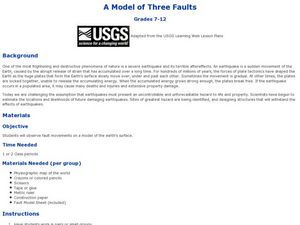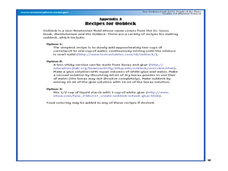It's About Time
Plate Boundaries and Plate Interactions
How does the Earth continually repair itself? Explore the answer to this question, and others, with a unit on plate boundaries and interaction. Pupils classify the types of movement at plate boundaries and identify the distribution of...
NorthEast Ohio Geoscience Education Outreach
Investigation of Plate Boundaries
Demonstrate the movement of lithospheric plates due to convection in Earth's mantle. Learners then model the movements that occur along plate boundaries using colored clay.
Science Matters
A Model of Plate Faults
The San Andreas fault is one of the longest fault zones in the world. In a series of 20 lessons, the fourth lesson has pupils use a paper model to recreate various types of plate faults. Each is held in position then drawn into a science...
Curated OER
Plate Tectonics: Fourth Grade Lesson Plans and Activities
The pre-lab portion of the lesson introduces emerging geologists to the various layers that make up Earth. After completing a sheet on the identification of the layers, class members simulate plate boundaries and their...
Science 4 Inquiry
Edible Plate Tectonics
Many people think they can't observe plate tectonics, but thanks to GPS, we know that Australia moves at a rate of 2.7 inches per year, North America at 1 inches per year, and the Pacific plate at more than 3 inches per year! Scholars...
It's About Time
Effects of Plate Tectonics
Explore our world from within as you lead young scientists on a thrilling adventure. Pupils examine the location of plate boundaries to determine earthquake and volcano distribution around the globe and explore the cause of hot spots in...
Curated OER
Plate Tectonics: Second Grade Lesson Plans and Activities
Second graders explore convection currents and how they relate to the movement of tectonic plates. Then, young geologists reconstruct Pangaea with a worksheet and pinpoint plate boundaries on a map using locations of earthquakes and...
Curated OER
Snack Tectonics
Yum! Using graham crackers, dried fruit sheets, and frosting, tectonics technicians demonstrate the different types of plate boundaries. If you want to encourage youngsters with an activity that is both educational and edible, then this...
Curated OER
Plate Tectonics: Fifth Grade Lesson Plans and Activities
Fifth graders continue their investigation of the plate tectonics cycle with an exploration of the movement of Earth's crust. During the lab, young geologists conduct an experiment to discover the result of different types of stress...
Curated OER
Plate Tectonics: Kindergarten Lesson Plans and Activities
This unit focuses primarily on plate tectonics and plate boundaries surrounding continents. It contains pre- and post-lab sections that walk young geologists through plate movements in order to visualize what's going on inside Earth.
Curated OER
A Model of Three Faults
Students observe fault movements on model of the Earth's surface, find fault movements associated with different types of plate boundaries, research examples of non-plate boundary faults, and research and report on the types of faults...
NOAA
Plate Tectonics I
Young geologists get a glimpse beneath the earth's surface in this plate tectonics investigation. After first learning about the different layers of the earth and the constant movement of its plates, young geologists work in small groups...
PBS
Lessons - Feeling Hot, Hot, Hot!
Volcanoes are among the most spectacular geological features on the planet. Jump into an exploration of these amazing phenomenon with this multimedia lesson plan series. Working collaboratively in small groups, young scientists view...
Curated OER
Plate Tectonics
Help young scientists piece together the theory of plate tectonics with this comprehensive collection of materials. Whether your are looking for worksheets, hands-on activities, or assessments, this resource has everything a science...
Google
Plate Tectonics Questions
Investigating plate tectonics, boundaries, and the earth's physical attributes is the focus of this short answer, tectonic plates worksheet.
Curated OER
Teaching About Plate Tectonics and Faulting Using Foam Models
Young scientists learn about plate tectonics and the three different types of faults (normal, reverse, and strike-slip) using foam models. The activity also covers common types of locations where these faults are found.
Curated OER
A Model of the Sea-floor
Students create a paper model to illustrate sea-floor spreading.
Curated OER
Using the New Zealand plate boundary models
Students examine the differences in the effects of the tectonic plates of New Zealand. In this tectonic plate lesson, students define and explain the process of subduction. Students recognize the difference in the movement of a...
Curated OER
Graham Cracker Plate Tectonics
In this plate tectonics worksheet, students use Graham crackers, frosting, water and a paper plate to simulate tectonic processes such as convergent, divergent and transforming plate boundaries.
Curated OER
Plate Tectonics
Students watch a video about plate tectonics. in this Earth Science lesson, students watch a video clip from Bill Nye about Continental Drift and Plate Tectonics. They make a slight crack in a hard boiled egg and manipulate the egg to...
Curated OER
Volcano!-Thar She Blows!
Young scholars describe how volcanoes are formed. They name the types of boundaries where volcanoes occur. They utilize models to illustrate the occurence of volcanoes and earthquakes along plate boundaries. They compare and constrast...
Curated OER
Puzzle of the Plates
Students research tectonic plates and their movement. In this plate lesson, students describe the motion of these plates and the boundaries between them. They look into the San Andreas Fault and explore the earthquakes associated to this...
Curated OER
Plate Tectonics & Land Forms
Fourth graders discuss the different interactions of plates and the ways mountains are created. In this plate tectonics lesson students complete an activity in groups.
Curated OER
Modeling Plate Tectonics
Students investigate the four different ways tectonic plates interact at their boundaries. Using simple available materials, they create models to simulate these interactions present at plate boundaries.

























